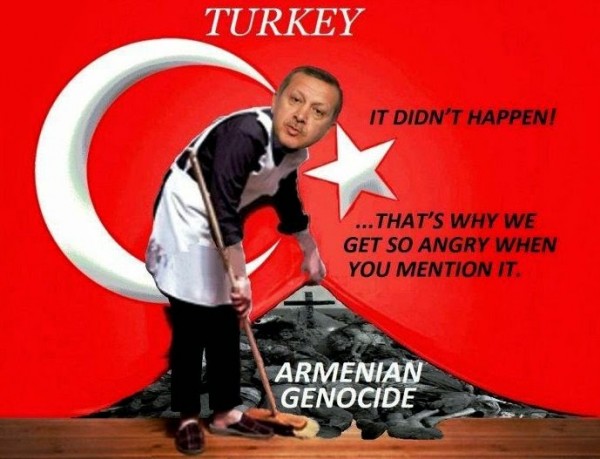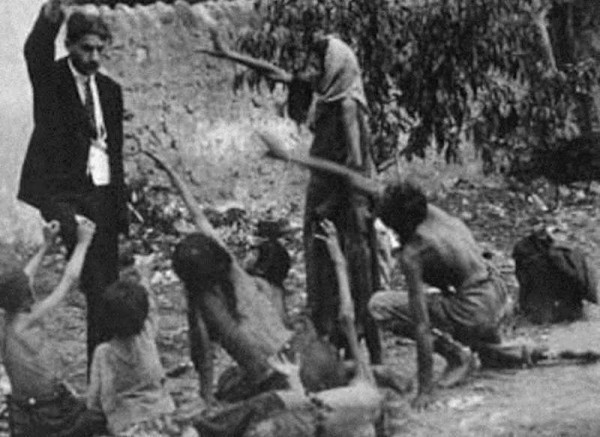
President Barack Obama on Friday soothed a key foreign ally but antagonized some Americans with long memories, by issuing an annual proclamation commemorating the 1915 expulsion of Armenians from present-day Turkey that studiously avoids the term “genocide.”
In his eighth and final Armenian proclamation, Obama followed his past practice and that of previous presidents by finding synonyms for the word, which Armenian-Americans say is essential to an accurate description of what took place but that the Turkish government finds objectionable.
Obama used “Meds Yeghern,” an Armenian phrase sometimes roughly translated as “great catastrophe” or “great calamity,” to describe the events in commemorating their 101st anniversary. While Armenians consider the phrase essentially synonymous with “genocide,” it lacks the same global punch.
“Today we solemnly reflect on the first mass atrocity of the 20th century – the Armenian Meds Yeghern – when one and a half million Armenian people were deported, massacred and marched to their deaths in the final days of the Ottoman Empire,” the president said.
 The White House issued Obama’s five-paragraph statement in advance of Armenian Remembrance Day, April 24. On that day in 1915, hundreds of Armenian intellectuals were arrested in Turkey and killed or exiled, the start of an eight-year-long mass ordeal.
The White House issued Obama’s five-paragraph statement in advance of Armenian Remembrance Day, April 24. On that day in 1915, hundreds of Armenian intellectuals were arrested in Turkey and killed or exiled, the start of an eight-year-long mass ordeal.
“We honor the memory of those who suffered during the dark days beginning in 1915 – and commit to learn from this tragedy so it may never be repeated,” Obama’s statement said.
But as with presidents including George W. Bush, Bill Clinton and George H.W. Bush before him, Obama drew far more attention for the word he didn’t use than for the words he’d polished and made public.
As a candidate, Obama had sought Armenian-American votes by endorsing the “genocide” term as appropriate for the events that lasted through 1923.
“We have learned that there is a difference between campaigning and governing,” Aram Hamparian, executive director of the Armenian National Committee of America, said in an interview.
An exception was Ronald Reagan, who on April 22, 1981, issued a proclamation citing “the genocide of the Armenians” that preceded the Holocaust.
“Recognition of the Armenian genocide could have been a proud part of (Obama’s) legacy,” said Rep. Adam Schiff, D-Calif. “Instead, this decision will be just another sad milestone in the struggle to prevent genocide by exposing genocide and its perpetrators.”

Hamparian, who met with White House National Security Council staff Thursday about the issue, likewise blasted Obama for “caving in to pressure from Turkey and betraying his commitment to speak honestly about the Armenian genocide.” Other activists said much the same.
“America deserves a president who speaks truthfully and condemns all genocides,” said Armenian Assembly of America Executive Director Bryan Ardouny, adding that “selective acknowledgment . . . is indefensible, sends the wrong message and hurts U.S. credibility.”
In past debates, genocide-resolution critics have cautioned that the language could inject uncertainty into a restive region and strain relations with a strategically placed NATO ally. American warplanes make heavy use of Turkey’s Incirlik Air Base.
The country also is a serious customer of the U.S. defense industry, which further strengthens its hand. Last year, for instance, the Obama administration approved selling $70 million worth of “joint direct attack munitions” and $310 million worth of upgrades for the Phalanx ship defense system.
The Turkish opposition – echoed by some U.S. diplomats, military leaders and corporate executives – has also helped block congressional Armenian genocide resolutions for years. The latest House of Representatives resolution – introduced 13 months ago, with 66 co-sponsors – has still not had a hearing.
In 2000, then-Rep. George Radanovich, who represented much of the Fresno, California, area, came close to getting a genocide resolution to the House floor. But then-Speaker Dennis Hastert, R-Ill., yanked it, at the request, Hastert said, of the Clinton administration. Hastert subsequently joined a lobbying firm paid $35,000 a month by Turkey.
SACBEE
Leave a Reply
You must be logged in to post a comment.